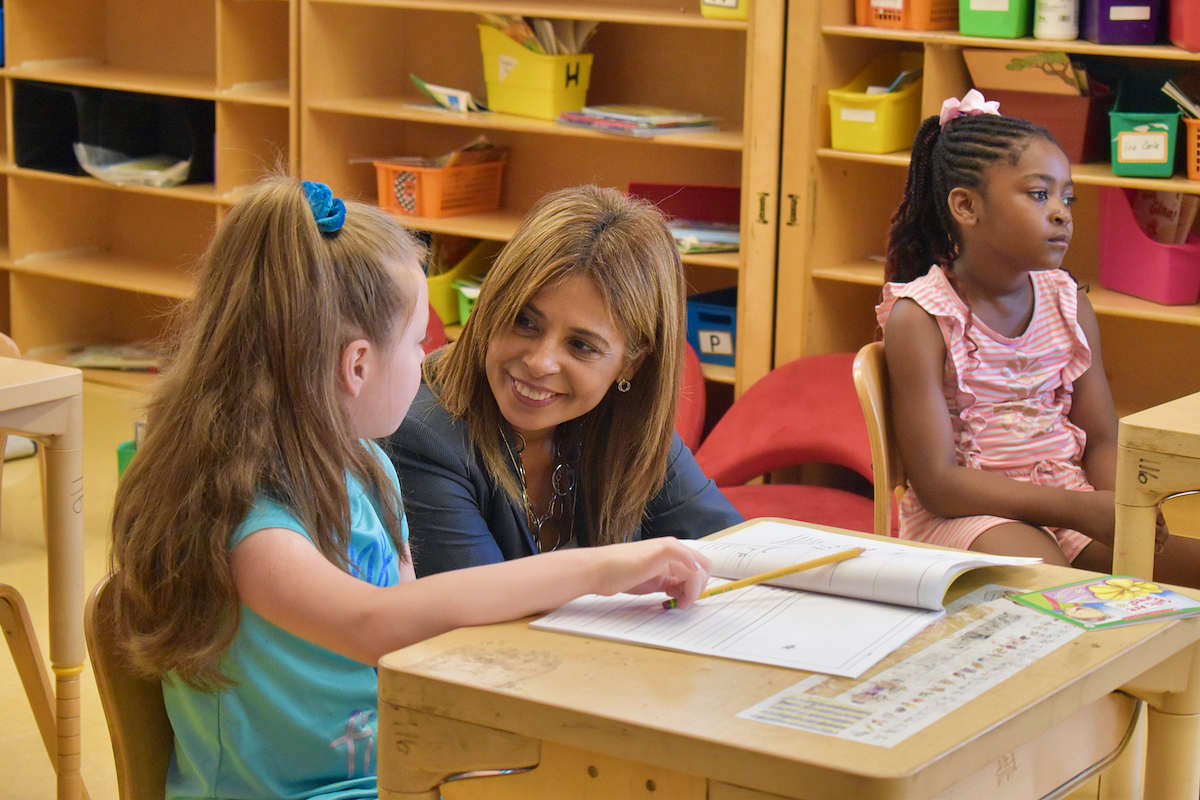
Maya McFadden file photo
Supt. Madeline Negrón, at Troup School in July.
When a child learns to read, they unlock an entire new world of possibilities in both learning and in life. Conversely, if a child does not learn to read or remains a struggling reader, difficulty and challenge are likely to follow.
A high school diploma. A college degree. A good-paying, high-skilled job. A life of opportunity. So much of this is tied to whether or not a student has strong literacy skills. The impact is that profound.
A child’s elementary schooling is where the foundation of language and literacy are built. Unless students learn to read by the end of third grade, they are highly likely to remain struggling readers and suffer academic difficulties across all subjects. Studies have also shown a direct correlation between third grade reading proficiency and high school graduation. Therefore, the transition for students from learning to read to reading to learn is critical for their lifelong success.
As a 28-year educator I have worked with children all along the reading development continuum and have seen firsthand the impact high quality language and literacy instruction can have on the most struggling readers. As a child, I moved from Puerto Rico to Connecticut at the age of ten, I couldn’t speak, read or write English. I did not get the support I needed in school to become literate in English, and for years I struggled.
I know what it’s like to feel lost in the classroom, to feel unsuccessful in school, to fear that your academic and future success is in jeopardy.
In New Haven and across the country, too many of our students are struggling just like I did – and the pandemic and learning loss that resulted from it has further exacerbated this challenge.
On the most recent state assessment, 16 percent of our third graders and 24 percent of our third to eighth graders met or exceeded grade level expectations in English Language Arts. Nationally, reading proficiency scores have remained stubbornly low and recently declined to their lowest level in decades.
While assessment scores are only one measure of student success, they are deeply concerning and not what any of us want for our students. However, what I also know from my experience as an educator and as a student is that these numbers do not reflect the abilities, capacities and efforts of our children and educators. They reflect students in need of more effective instruction, families in need of stronger guidance, educators in need of additional support and a system in need of change.
For all these reasons, a deep, continual and concerted focus on language and literacy will be a top priority for New Haven Public Schools (NHPS) moving forward.
The good news is we’re headed in the right direction. Here’s why.
First, New Haven Public Schools is implementing a new early literacy curriculum that is now evidenced-based and anchored in the Science of Reading. It was piloted in multiple schools last year and the initial results and feedback from teachers has been very promising. Our teachers and literacy coaches have received initial training (with much more to come) and this newly adopted structured literacy approach will be launched in all our elementary schools at the start of this school year.
Second, we’re providing our students with additional instruction and more time on task to support their learning and literacy skills. Through New Haven Public School’s Summer of Fun learning program, hundreds of students have received an additional four weeks of academic support – and, prior to that, our Saturday Success Academy did the same throughout the school year. We will continue these initiatives moving forward.
Third, we’re working in collaboration with our nonprofit and community partners to support our most struggling elementary students. The New Haven Tutoring Initiative, a joint multi-year effort by the City of New Haven, a consortium of local nonprofits and NHPS, is leveraging trained staff and volunteers to provide high-dosage weekly tutoring to hundreds of elementary school students through existing summer and afterschool programs as well as hosting Family Literacy Nights to provide parents with information, materials and training to help support their child’s reading at home. The New Haven Free Public Library also organized a summer reading challenge encouraging families to read at least 20 minutes per day and also provided additional tutoring to help stop the summer learning slide when our students are not in schools.
This is indeed an all-hands-on-deck effort and the challenge before us is a significant one. It will take time, resources and a sustained commitment from students, caregivers, educators and the community.
However, our students and teachers deserve nothing less.
Together, through language and literacy, we will write New Haven Public School’s next chapter of excellence and help unlock the promise of our young people and our city for generations to come. Let’s get to work.
Dr. Madeline Negrón is the superintendent of the New Haven Public Schools (NHPS) district.







Once again numeracy plays second fiddle.